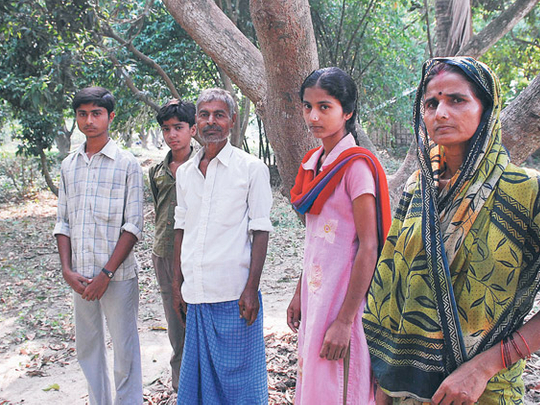
Patna: At a time when the declining gender ratio and the environmental imbalances have been the cause of global concern, a village in the eastern Indian state of Bihar has emerged as a role model for others by addressing the twin issues through a method not unheard of till date.
Dharhara, a small village tucked away in crime-infested Naugachhia block in eastern Bihar's Bhagalpur district, has encouraged the villagers to plant at least ten fruit-bearing trees each to celebrate the birth of every girl child. Today, both the girls and the trees coexist together, supporting each other.
Girl children and their families nurse the trees and the latter in turn solve their dowry woes, an age-old practice largely prevalent in the Indian society.
Trees planted at the time of their birth grow side by side the leaps of babies, and turn mature when the girls are ready for marriage. They earn them enough money — by way of fruits and woods — to get a groom of the family's dream.
"I earned around Rs200,000 (Dh15,700) from 10 mango and litchi trees, and today I am in a position to search a suitable groom for my daughter," said a local villager Subhash Singh whose daughter Harshita Kumari has attained the marriageable age.
‘Like family members'
Another villager Shankar Singh who has planted as many trees in the name of his daughter Sneha Surabhi, now 4, said: "Trees are like our family members. We take full care of them since they help us in time of crisis. Girls' marriage is no problem for us."
Dowry is an ancient custom in Indian society and every girl's family has to arrange for "attractive dowry packages" depending upon qualifications, job profile and social status of the grooms. It does not matter if the girls are highly qualified or have hefty pay packages.
According to a survey conducted by a Patna-based NGO, Chandraprabha Chand, the dowry rate for a matriculate/intermediate pass boy in India is currently Rs50,000, graduate/post-graduate Rs70,000, class IV employee Rs150,000, class III employee Rs250,000, Class II employee Rs400,000 while the dowry demand for a Indian Administrative service/Indian Police Service officer is Rs2,500,000.
Boys dealing in business, on the other hand, seeks dowry in between Rs150,000 to Rs500,000, as per the survey.
The widely hailed tradition of tree planting has also checked female foeticide in and around the village, since more villages are now joining to plant trees to celebrate the birth of girl babies.
Bringing gloom
Significantly, girl babies are unwelcome in most parts of the country and their birth is considered to be bringing gloom in family.
An official report said Bihar has 921 females for every thousand males. This gender ratio is even more alarming in case of other Indian States like Haryana — notorious for honour killing — which reports only 804 girls for every thousand males, Punjab (876 females), Uttar Pradesh (898) and Madhya Pradesh (920).
Local villagers say the practice of tree planting for celebrating birth of girl children is quite old.
"Nobody exactly knows how, when and why the practice started. We heard it from our father-in-law and they from the other elder family members but we are indeed indebted to our forefathers who started such a good custom," said Nirmala Devi, who settled at the villager after her marriage in 1957.
"Besides keeping us healthy and the environment clean, trees give as insurance cover for our daughters. People in town make fixed deposits in banks but for us, these trees are our deposits," added Nirmala, a mother of two girls.
She says her husband and family members planted as many as 60 trees when her first daughter was born. Today she is a proud owner of four orchards spread over in about 10 acres.
Total cover
How the villages are deeply associated with tree planting is underlined from the fact that they have named their trees after their girl children, such as Sarswati, Arti, Kajol etc. Their love for plants have ensured cent per cent green cover at this village while Bihar boasts a forest cover of only 7.4 per cent.
The villagers' love of planting impressed chief minister Nitish Kumar so much so that last month he paid a visit to this village during the course of his Vishwas Yatra, a pre-election campaign to showcase his government's achievements ahead of forthcoming state assembly polls due later this year.
An indebted chief minister also planted a sapling in the name of a girl baby Luvi Kumari.
"It's great that you people are saving environment and girls. Now we will tell the world about your precious effort," Kumar told the villagers.












